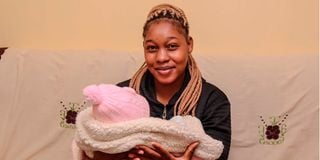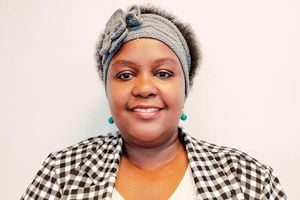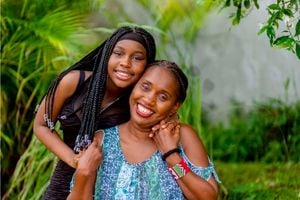
Caroline Beneka Nicholas, 22, with her baby during the interview in Nairobi on July 20, 2024.
The thought of becoming a parent in your 20s can be quite overwhelming. It elicits a roller-coaster of emotions — the highs of excitement and joy of bringing forth life, and the lows of self-doubt, bills, and fear of the unknown.
For some, these uncertainties act as a natural birth planning method, and they put off having children until they feel ready and in their 30s or 40s. However, others choose to strike while the iron is flaming hot and go ahead to have children in their early 20s.
At 22, Caroline Beneka is a mother to a three-month-old girl. Speaking to Lifestyle at her home in Kasarani, Nairobi, her eyes light up as she talks about her journey to motherhood.
“I got the news when the pregnancy was less than a month old. I was experiencing unusual symptoms and decided to go to the hospital. That was the best news for my husband and I,” says the mother of one.
Elated, Caroline began counting the days until they would go for a gender scan. She wanted to plan for the baby to the letter. Besides, her curiosity would not allow her to know the sex of the baby at delivery.
“We bought almost everything that our baby would need, and each day she was growing in my womb, made me adore her more. I could gently massage my stomach while singing baby songs for her.”

Caroline Beneka Nicholas, 22, who is a mother of one, during the interview in Nairobi on July 20, 2024.
Caroline works in the beauty industry, which allows her to interact with other mums and ask questions about birth and motherhood.
Labour pain was her biggest fear, and she kept comparing the birth stories of the different women she interacted with.
Thanks to TikTok, she also watched pregnancy and birthing videos that enlightened her.
“I got my baby at 6.15 am. It was such a relief after being in labour for almost 10 hours. I feel so happy when I breastfeed, bathe, dress, and watch her sleep in my arms. We named her after my husband’s mother,” she says.
Michael Barnabe became a dad at the age of 25. When we met him at his home in Dagoretti, Kiambu County, he was in the company of his jovial four-year-old daughter. His favourite part of the day is listening to his daughter recap what she did in school. He listens spellbound.
“My baby is very intelligent. She is in playgroup and recognises things so fast. She speaks English. Her vocabulary is quite impressive,” he tells Lifestyle.
By the time Michael got married to his wife, they were already expecting their firstborn. He had just completed his diploma course and was unemployed. Despite having no steady income, he received the news of the pregnancy with joy and quickly began making adjustments to prepare for fatherhood. He had always wanted to be a dad.

Michael Barnabe in Kawangware, Nairobi on July 14, 2024.
“She got pregnant before we got married. Fortunately, I had left my parent’s home and was living alone. We decided to take the next step and start our family,” he says.
He says being a father in his 20s has made him mature faster than he thought.
“My family looks at me as a leader so that has changed me. I know that I am a good dad to my daughter. She is in playgroup, and that makes my parenting full of fun,” says Michael, who now partly earns from football academies as he trains student players for interschool competitions.
Dad at 26
George Gicho, a banker, also got his firstborn when he was 26. Now 34 years old, he says he had just graduated from the university and was new at his first job when he became a dad.
The news about him becoming a dad was received with mixed reactions from his parents. His mother felt that he was still too young to be a parent. However, his dad encouraged him, making it less an isolating experience.
“I owe my journey to becoming a dad a lot to my father. He believed in me. He showed me that being a father comes with a huge responsibility,” says the father of two.
His firstborn, 8, is now in Grade 3, and the secondborn is in Grade 1. The uncertainties of what the future holds for him and whether he would provide for his children’s needs have been fading over the years. This has made fatherhood more enjoyable.

George Gicho, a father of two and a banker, during the interview at Nation Center in Nairobi on July 13, 2024.
“My biggest fear was the finances, but then I realised that ever since my children came into my life, I have been more inspired, driven, and pushing myself. Because I am a dad, I am always looking for the next job promotion or bonus, and I am also trying different business ideas,” he says.
George adds that his lifestyle changed too. He used to hang out with his friends a lot, but not anymore. He has also learned the art of investing every single coin he earns.
“I always look forward to the end of every day to hug my babies, then know how their day was, do homework together, and spend time with them before they get to bed,” he says.
With a growing number of first-time Kenyan parents nowadays being over 30 and rising, having children in your 20s is increasingly unusual. People who get married and have children young are seen as risk-takers.
However, experts say swapping nights out at pubs, for endless night feeds has its benefits.
Emily Mukomunene, the author of a book focusing on early parenthood, says the benefits of being a young parent outweigh the fears.
“Being a parent in your 20s gives you a lot of joy and the essence of responsibility. You feel you need security, and at the same time, you have somebody who needs your protection. That gives you the stamina to want to improve yourself because of preserving and taking care of that young child,” she says.
Breast cancer
There are good reasons why fewer Kenyans are not having children in their 20s, which a lot to do with harsh economic times and the desire to build career and wealth before jumping into parenthood.
But tight job market aside, doctors say the 20s is the ripe time and it reduces health complications on the child and the parents too.
Dr Salesio Nyamu, the founder and CEO of Komarock Modern Healthcare in Nairobi, says that there are several advantages of having your children while young. Topping the list is that a woman’s hormones are alive, meaning, her fertility levels are high, so conceiving will not be a problem.
“Of course, you want to bring children when you are energetic. Otherwise, if you get old, then that becomes an issue,” he says. Also, naturally, when you are done with getting children early, Dr Nyamu says, the woman can concentrate on other issues in life, like a career.
Though the age to start having children is dependent on the person, Dr Nyamu says for women, 24 years onwards is a perfect time. Research shows the quality of a woman's eggs is highest in her mid-20s through her early 30s.
“By this time, [24], many are done with their university studies and can start a family. But generally, at least before 35 years. After 35, fertility issues begin. I have encountered women whose menopause started at 37 years old,” he says.
Delaying childbirth can cause other complications that can deter a woman from getting pregnant, like developing fibroids which block her fallopian tubes.
“Also, there are conditions that are common, like Down syndrome, in people who have children after a particular age," he adds.
Do children born by women in their 20s have a higher intelligence quotient?
“While there is some truth in it, we cannot say it is in everyone. The genes and hormones that help in the development of a young person are stronger. When you are young, you are very active, so you can eat better. You need a healthy baby by feeding, so eating food rich in folic acids, amino acids, and those elements that help in brain development and parts of the baby,” Dr Nyamu adds.
For the majority of women, the egg reserve starts declining after they reach 35 years of age. Nonetheless, Dr Nyamu shares that there are women with a lower egg reserve even before they hit 35 because of certain life conditions.
Having children in 20s also means that you breastfeed them while you are young, reducing the risk of breast cancer.
Prof Ronald Wasike, a breast surgical oncologist and general surgeon at Aga Khan University Hospital, says about 40 per cent protection from breast cancer is when a woman breastfeeds for at least two years for every child she gets before 35 years of age.
Prof Wasike who has been a breast specialist for almost three decades, says that having no children, not exclusively breastfeeding for six months, and having your first pregnancy after 30 years are some of the additional factors that may increase the chances of breast cancer.
Additional reporting by Wangu Kanuri









